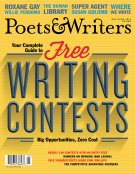Martinez is particularly proud of this period in his education. “I only wrote in metrics for two years, which sharpened my idea of line integrity and what could happen with language in a line,” he says. And although he has moved away from metrics since then, he affirms that meter is always in the back of his mind when he writes.
He credits teachers Glover Davis and Sandra Alcosser at SDSU with providing him with guidance and championing him to continue to write poems. “As soon as I got into the master’s program,” he recalls, “I decided to get this.” He holds up his forearms. He has Poetic tattooed on his right, License tattooed on his left. “When I go at something, I go at it hard.”
Writing poems, he discovered, was exactly that “something bigger” he was searching for. It engaged him on an intellectual and emotional level—awakening a part of his identity he had repressed while trying to live up to the tough-guy image in his old neighborhood, in his troubled relationship with the mother of his kids, and even in the navy. “I had been unhappy for so long, I didn’t realize I could be happy again,” he says. And indeed, there was plenty of satisfaction in struggling with writing a poem: The page was manageable, and yet it was expansive enough to contain the gravity and complexity of his life experiences.
During the time he was in college he met and eventually married a woman who shared a similarly complicated past, particularly with her parents. “We helped each other heal,” he says. The marriage lasted five and a half years before they divorced amicably, which made him feel he had achieved a maturity he had been lacking.
It took Martinez five years to complete his MFA, but he was fine with such a slow pace. It gave him time to write obsessively and read well into the night. “I still do,” he says. “I don’t get much sleep. Instead I read.” On those sleepless nights he devours poetry anthologies and tackles philosophy, particularly Nietzsche, because it reminds him of those times he tried to unpack his language as an unseasoned reader.
But before he made the move to Houston’s PhD program, he had one more important stop on his journey—Barrio Logan, across from San Diego’s famed Chicano Park. There Martinez lived for two years working as an adjunct at San Diego City College and at San Diego High School in the summers. “Culturally it was a rich experience,” he recalls, “but financially it was a disaster.” Though he finally found a community that nurtured his Chicano identity, he longed for the artistic space that stimulated his own creative instincts. Since they had been thriving in college, he decided to return to school and pursue a doctorate post-MFA.
At Houston, he met and was mentored by seasoned professionals like poet Tony Hoagland, who says he saw in Martinez’s work “a linguistic diversity, and the almost overconfident sense on the part of the writer that he could do anything that occurred to him inside the poems—that adds up to ambitiousness and potential.”
“David has a big, open, and honest heart,” Hoagland adds, “and his willingness to face, in his poetry, the griefs and brutalities and shames of manhood, and to explore and articulate those masculine secrets is like a sharp skewer that pierces through your heart now and then when you read the poems. Vulnerability is a talent too, you know.”
It was Hoagland who pushed Martinez to start thinking about publication as he entered his final year at Houston, and who believed Sarabande Books might be a good fit. Martinez submitted his manuscript and Sarah Gorham, editor in chief, took an immediate interest.
“I loved it after just one read-through,” Gorham recalls. “Martinez’s history is one of violence, machismo, dangerous sex, father hate, mother love, beat-up cars, drive-by shootings. And yet he has emerged with a poetry keen with emotional intelligence, wild with energy and grief, transcendent even while it rolls in the dust spotted with broken glass. No way is the book not going to make an impression.”
Martinez hopes that will be the case. “I’m excited about Hustle,” he says. “Like the tattoos on my body, this book encapsulates my transition from being a white child, to being a black-identified teenager, to being a Chicano and coming to an education about myself and the world that shaped me. Hustle is my attempt to define key aspects of my identity: masculinity, family, sexuality, and socioeconomic status, because everything’s a hustle—life, work, even poetry.”
Martinez understands the opportunities before him and he plans to take advantage of them, though he makes it a point not to conceal his checkered past. “If I can turn my life around, anyone can,” he declares. Second chances are indeed important to him—it’s why he returned to school, and why he married again. He and his wife Brittney are about to celebrate their second anniversary.
Martinez stands up to stretch and points out the tattoo parlor in a pink building across the street. “It’s why I eat here,” he says. “I like the view.” Though he considers himself a “California boy” to the bone, he’s grown fond of Houston and wouldn’t mind sticking around for another few years. But he understands the odds, particularly as he takes his chances on the competitive job market for teachers in the fall. Whatever place he calls home next, the only certainty at this point is that he’ll have a couple of new tattoos by then.
Rigoberto González is a contributing editor of Poets & Writers Magazine.








